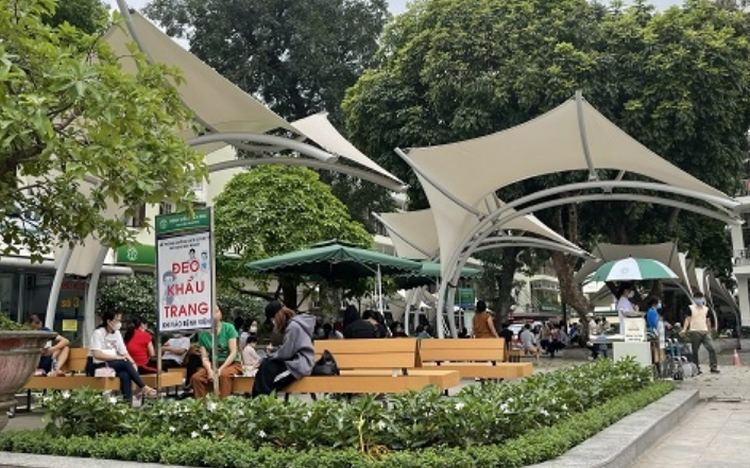
Sunshades are installed at Bach Mai Hospital in Hanoi. Photo: Supplied
The Department of Medical Service Administration under the ministry issued a directive urging hospitals to enhance healthcare services during the heatwave.
Key recommendations include installing shade structures and cooling fans, and improving ventilation in patient-dense areas such as waiting halls and corridors.
Hospitals were also urged to mobilize resources to install air conditioners wherever feasible.
According to the department, the prolonged heatwave is disrupting daily life and increasing health risks, particularly for vulnerable groups.
As such, hospitals must prepare essential medical supplies, emergency equipment, and vehicles to handle cases of heatstroke, sunstroke, and especially strokes.
Medical personnel should also be retrained in emergency protocols for these conditions.
Hospitals were encouraged to collaborate with local media and preventive healthcare centers to raise public awareness about how to protect themselves from heat-related illnesses and avoid sudden changes in environmental temperature.
In addition, the department emphasized the importance of free drinking water for both patients and their caregivers.
Hospitals should ensure an adequate supply at clinical departments and waiting areas, and increase the number of water dispensers where demand is high.
Public guidance on heatwave safety
To minimize the impact of extreme heat, the Ministry of Health recommends the following precautions for the public:
-- Avoid outdoor activities between 10:00 am and 4:00 pm. If going outside is unavoidable, people should wear protective clothing, hats, sunglasses, and face masks to shield against direct sunlight. It is necessary to refrain from extended work under the sun or in poorly ventilated environments, and limit physically demanding activities.
-- Stay hydrated by drinking at least 1.5-2 liters of water daily. Dehydration and electrolyte imbalances can lead to circulatory collapse, serious complications, or even death if not managed promptly.
-- Eat a balanced diet, reduce salt intake, and increase consumption of vegetables and fruits to boost immunity.
-- Work in ventilated areas to prevent heat exhaustion and sunstroke. When using electric fans, people should avoid prolonged direct airflow to the body to prevent chills.
-- Monitor health regularly, especially for the elderly, children, and individuals with chronic conditions like hypertension and cardiovascular disease.
In case of symptoms such as fatigue, headaches, dizziness, high fever, or nausea, residents should call emergency services or head to the nearest medical facility for immediate care.


Max: 1500 characters
There are no comments yet. Be the first to comment.